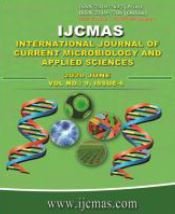


 National Academy of Agricultural Sciences (NAAS)
National Academy of Agricultural Sciences (NAAS)

|
PRINT ISSN : 2319-7692
Online ISSN : 2319-7706 Issues : 12 per year Publisher : Excellent Publishers Email : editorijcmas@gmail.com / submit@ijcmas.com Editor-in-chief: Dr.M.Prakash Index Copernicus ICV 2018: 95.39 NAAS RATING 2020: 5.38 |
Village adoption is a scientifically proven method for effective extension service to the farmers. The extension interventions in the village can be planned by considering the Socio economical and agricultural situations prevailed in the village. An attempt was made to understand the village especially the existing crop nutrient management practices of the farmers. Seetharampuram village from Warangal Rural district of Telangana is selected by Regional Agricultural Research Station, Warangal (PJTSAU) to impart technical advices the farmers. A semi structured interview schedule was prepared and Soil samples were collected to analyse the existing crop nutrient management practices of the farmers. Soil analysis report from 203 samples randomly collected by covering throughout the village fields and found that soils are neutral to strong alkaline in reaction (pH-7.0-9.06), Non saline to Saline in nature (Ec-0.30-2.95dS/m), organic carbon is low to medium (0.10-0.74%). Nitrogen is low to medium (88-339Kg/Ha) Phosphorus and potassium are medium to very high at 37-228Kg/Ha and 297-1309Kg/Ha respectively. Based on the responses from 60 randomly selected farmers in the village and considering soil analysis data, there is lot of discrepancy observed from recommended practices to the practices of farmers. Though crop yields are on par to the expectations but there is a lot of scope to reduce the chemical fertiliser usage and cost of cultivation. Trough this study, it has been estimated that, Rs. 8,61,250/- can be saved to the village on soil nutrient management. Besides, interventions towards sustainable agriculture, enhancing technical knowledge to the farmers and counter to depletion of soil nutrients are manifested as a part of technical empowerment in the adopted village.
 |
 |
 |
 |
 |